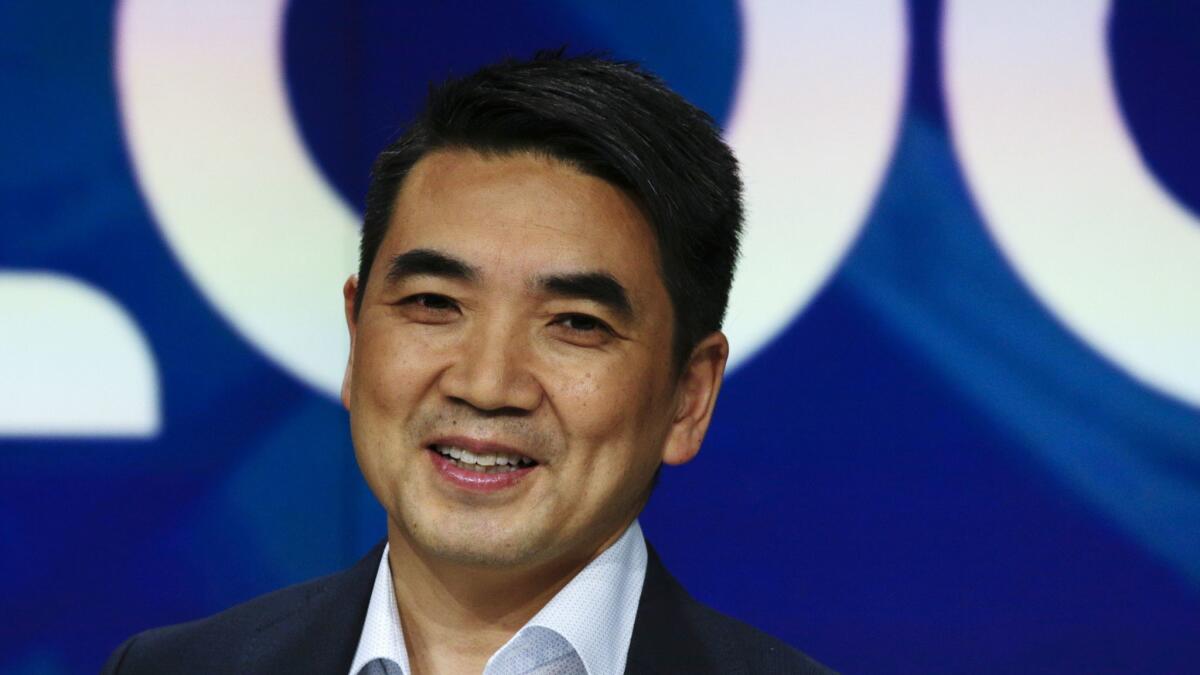Zoom’s China-born founder vaults to billionaire status after whiz bang IPO

After hearing Microsoft Corp. co-founder Bill Gates give a speech about the internet three decades ago, Eric Yuan decided he wanted to become part of the Silicon Valley dot-com boom.
Then the China-born entrepreneur hit a snag. The U.S. government denied his visa application — eight times.
After two years of rejection, Yuan, 49. finally made it to the U.S. and is now the major shareholder of Zoom Video Communications Inc., a San Jose video conference services company that had its initial public offering this week and ended it first day of trading Thursday with a market cap of $15.9 billion after shares soared 72%.
That’s higher than the market cap of Pinterest’s far more hyped IPO, which also went to market Thursday and closed up 28% on the New York Stock Exchange, giving the online bulletin board a market cap of nearly $13 billion.
Zoom, which raised $751 million in its IPO, closed at $62 on New York’s Nasdaq Global Select Market, valuing Yuan and his family’s stake at $3.2 billion, according to the Bloomberg Billionaires Index. The stock rose so much that it surprised Yuan.
“The price is too high,’’ Yuan said in an interview with Bloomberg TV. “Today, wow, there’s a big pop. It is out of our control. We can just go back to work.’’
Yuan, Zoom’s chief executive, joins Alphabet Inc.’s Sergey Brin, Nvidia’s Jensen Huang and Tesla Inc.’s Elon Musk as immigrants who became billionaires after helping create Silicon Valley companies. The U.S. is the favored country for more than three-quarters of wealthy Chinese looking to emigrate, according to the Hurun Research Institute and immigration advisor Visas Consulting Group.
Before starting Zoom in 2011, Yuan was an early employee at WebEx Communications, an online conferencing firm, and then worked at Cisco Systems Inc. after it acquired the company for $3.2 billion in early 2007.
Yuan came up with the idea for Zoom — which counts Uber Technologies Inc. and Wells Fargo & Co. as customers — after repeatedly traveling 10 hours to see his girlfriend while they were college students.
“Someday, if I can have a smart device and with just one click I can talk with you, can see you, that was my daydream, right?” Yuan said in a July interview with U.S. venture capital firm GGV Capital. “And every day I thought about that.”
Unlike most tech unicorns that have gone public or plan to this year, Zoom has made a profit. It reported net income of $7.6 million last year on revenue of $331 million, compared with a loss of $3.8 million on revenue of $151 million a year earlier.
Zoom’s financials are “one of the most impressive’’ ever seen by D.A. Davidson in an IPO filing, analyst Rishi Jaluria wrote in a note to clients in March.
He said at the time that he wouldn’t be surprised if it reached a valuation of $10 billion to $15 billion on its first day as a public company — a prediction that ended up underestimating how much the stock jumped.
The company has said its mission is to make video communication “frictionless,” as more employees work remotely and use conferencing services to connect with co-workers. International Data Corp. has estimated that the segments of the market in which Zoom operates could be worth as much as $43.1 billion by 2022, according to a regulatory filing.
Its customers include Uber, which spent an average of 14 million minutes a month in Zoom meetings in 2018, as well as media company Discovery Inc. and software maker VMware Inc.
Still, the business isn’t without risks. Though the standard disclaimer in many IPO documents — that the company may never be profitable — is missing, Zoom cited increased competition, service outages and cybersecurity threats as concerns that investors should be aware of, acknowledging that its security measures have been compromised in the past and could be again.
Zoom also noted its large research-and-development operations in China, where it employed more than 500 people as of January. This, it said, could expose the company to “market scrutiny regarding the integrity of our solution or data security features,” especially against the backdrop of the Trump administration’s continued efforts to close a trade deal with China.
Stupples and Monks write for Blooomberg. Emily Chang and Nico Grant of Bloomberg contributed to this report.
More to Read
Inside the business of entertainment
The Wide Shot brings you news, analysis and insights on everything from streaming wars to production — and what it all means for the future.
You may occasionally receive promotional content from the Los Angeles Times.









